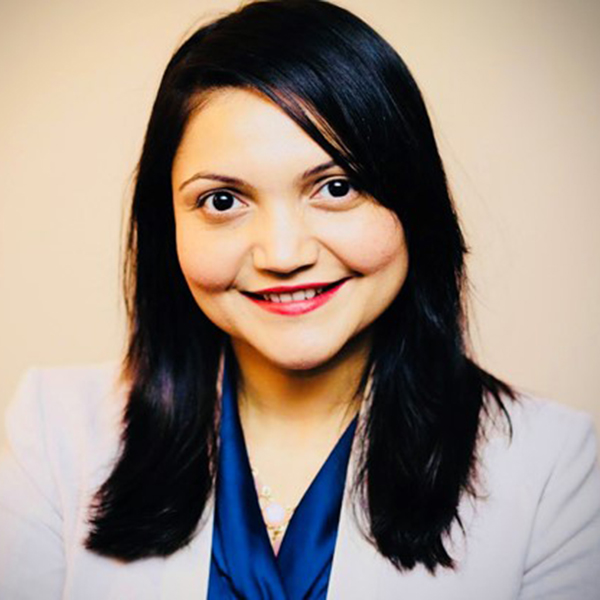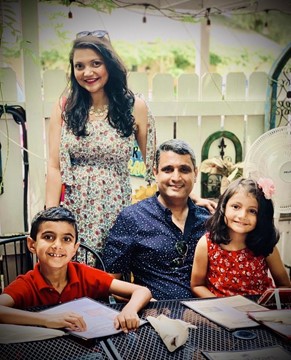Mother’s Day in the COVID-19 Pandemic

Kisses, hugs, cuddles, breakfast in bed and a beautiful brunch outdoors is how I remember celebrating Mother's Day with my kids in the past but 2020 was a bit different.
As a physician caring for children with COVID-19 along with being a mother of two young children, the celebration during this pandemic had been an unusual experience.
I vividly remember Mother's Day on May 10, 2020
The first surge of cases of Multisystem Inflammatory Syndrome in Children (MIS-C) related to COVID-19 had just hit our region. New York City was declared the epicenter in March 2020 and exactly six to eight weeks later, the tsunami of children affected with MIS-C started arriving at every hospital in New York. It caught us by surprise. A few weeks ago, we had received the UK alert about a mysterious illness affecting children after a COVID infection resembling Kawasaki Disease where children appeared more critically sick, presenting in shock, cardiac dysfunction, myocarditis, neurological or hematological complications. Being a pediatric cardiologist, I had cared for the first MIS-C child admitted to our hospital in April when we all struggled to make sense of this illness. It was my turn for a weekend call which happened to be on Mother's Day. Anticipating a busy day, I kissed my kids who were sleeping on a cozy Sunday morning and left the house early hoping to be back home soon. I knew that my 5-year-old daughter and 8-year-old son had been planning a special day for me secretly with their dad. I had seen them work on their cards whispering to their dad, giggling and making plans excitedly with 'Oohs' and 'Aahs.' I was loving every bit of it, looking forward to being surprised and pampered by them that day! Little did we know, the day would unfold differently.
It was 3 p.m. already. Inpatient rounds had dragged longer than usual due to the additional 'MIS-C /COVID huddle' where subspecialists, hospitalists and PICU staff huddle in a corner, trying to reach a consensus regarding the plan for every MIS-C child. I had finished seeing all new consults, discussed plans with the teams and families, and was trying to complete my notes hoping to be home for late lunch with family. Soon Tigertext on my phone started beeping. A 5-year-old with concern for MIS-C had just presented to the ER. As I discussed the plan, a stat consult was requested on a newborn transferred with cyanosis and tachypnea. After evaluating the newborn, performing an echocardiogram and finalizing a plan with NICU, I rushed to the ER. The child was positive for SARS-CoV-2. He was febrile (104 F) and was irritable. Donning the PPE gear, I entered his room. As I discussed the history with parents, I proceeded to examine him and perform an echocardiogram to check his cardiac function. Not a happy camper, he started crying and screaming. He flung his arms trying to push me away. The parents and nurse tried to hold him down while I tried to get a quick look at his heart with my probe. Being extremely upset, he fought back. In the shuffle, he grabbed my face shield and mask, accidentally pulling it off my face. I tried to stop him and attempted to adjust my PPE. The echocardiogram revealed moderate-severely depressed left ventricular function. For a moment, forgetting about my own worries, I tried to get the necessary images as soon as possible and then left the child's room. A comprehensive treatment plan was discussed, medications were started and he was admitted to the PICU. I had lost track of time and checked my watch. Just then, a sudden fear gripped me. The realization about what had just happened hit me. I could feel the little distressed child in the ER crying, coughing, breathing on my face. Had I been exposed to the virus during the time my mask and face shield had temporarily come off?

Pulling my car into our driveway, I saw my kids looking expectantly out the window. A big smile came to their faces and they rushed out the door to hug me. One look at them and tears welled up in my eyes. As they came running towards me, I stopped them. I explained that until I was tested for the virus, they had to stay away from me. They looked confused and sad. They told me that they had planned a scavenger hunt for my gift, flowers and had baked cookies for me. My 5-year-old said that she had missed me at breakfast, lunch and dinner and wondered if we could at least have dessert together. I explained that I couldn't sit together with them. I blew them kisses from a distance while we all cried. She was very upset for not being able to even hug me and cried herself to sleep as my husband put them to bed while I self-quarantined in a separate room and cried too. This Mother's Day was devoid of all cuddles and kisses. It instead was filled with fear and sadness.
Many children admitted with MIS-C at our hospital had been unintentionally exposed to the virus by their parents and loved ones. I could now identify with those mothers, experiencing guilt as they accompanied their children to the hospital. In medicine, we are often told to dissociate ourselves from our patients to become better physicians. I believe in the contrary. When vested in your patient, you strive further towards their care. It's especially hard not being attached to the child and family if you have kids of your own. Hence when the mothers had questions about long term effects of MIS-C on the child's heart, it led me to look for answers in ways where my training and expertise could help. We obtained important CMR findings in these children, in the acute phase of illness. Although logistically challenging, it played an important role in the pursuit of answers and understanding this disease process.
This pandemic has brought to light some stark realities of life. As health care workers, we are expected not to complain as we "signed up for this job." But the truth remains, in this pandemic, it is not our health alone that we worry about. The health of our families and children are at stake too. The anxiety, fear and guilt of bringing home the virus to loved ones, along with the mental stress of managing sick patients and sharing the concerns of distressed parents, end up taking a heavy toll on our health and well-being.
Although I had stressors, I also had some inspiration at home. Being a two-physician family, our work schedules along with remote schooling earlier, had left our two kids with no parent or friend. Yet they navigated the schoolwork all by themselves amazingly well and never complained. They truly were superstars! My mother was my other inspiration. She has been a lone fighter, living all alone in India in social isolation, trying to be safe during this entire pandemic which puts me in awe of her! (Admittedly, I worry about her every day, but she continues to smile and inspire me.)
During this pandemic, mothers across the world have faced many challenges including layoffs, furloughs, pay cuts, halt of promotions, working on COVID floors during pregnancy, balancing work and family, and taking care of loved ones living far away. This has left little time for them to think and care for themselves. The few things that have been reinforced to me by this pandemic is that health truly is wealth, close friends and family are invaluable, and mothers have nerves of steel but do require lots of TLC and time to decompress (family time with hugs and cuddles, 'me time' to do something you like, and time with girlfriends are some good options).
As we celebrate Mother's Day this month, let's remember to take care of ourselves and each other.
To all the supermoms out there, wishing you a very Happy Mother's Day! Do take time out for yourself, you deserve it!

